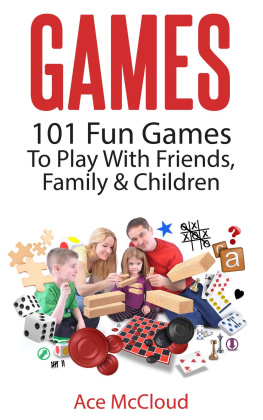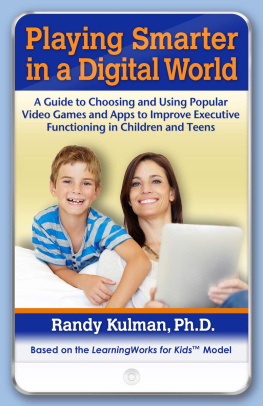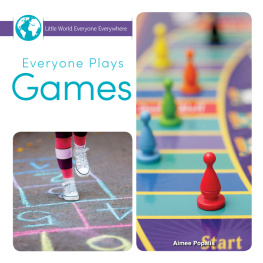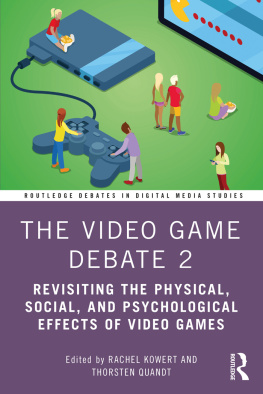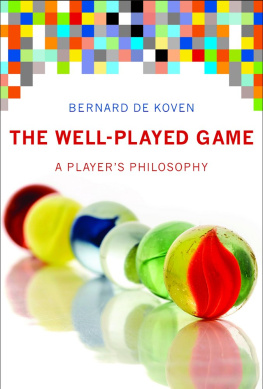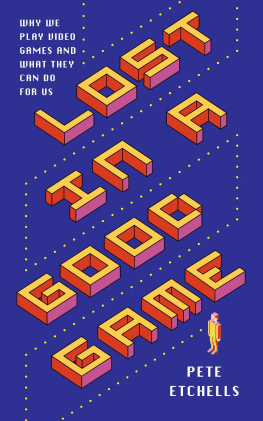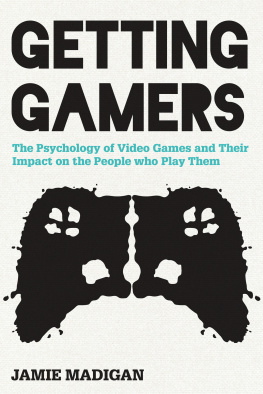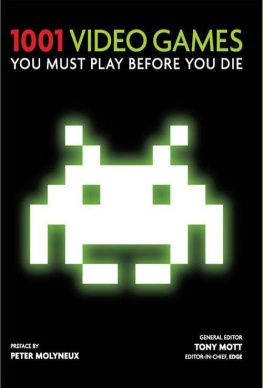Intergenerational Locative Play: Augmenting Family
MICHAEL SAKER
City, University of London, UK
LEIGHTON EVANS
Swansea University, Wales
United Kingdom North America Japan India Malaysia China
Emerald Publishing Limited
Howard House, Wagon Lane, Bingley BD16 1WA, UK
First edition 2021
Copyright 2021 Michael Saker and Leighton Evans
Published under exclusive licence by Emerald Publishing Limited
Reprints and permissions service
Contact:
No part of this book may be reproduced, stored in a retrieval system, transmitted in any form or by any means electronic, mechanical, photocopying, recording or otherwise without either the prior written permission of the publisher or a licence permitting restricted copying issued in the UK by The Copyright Licensing Agency and in the USA by The Copyright Clearance Center. Any opinions expressed in the chapters are those of the authors. Whilst Emerald makes every effort to ensure the quality and accuracy of its content, Emerald makes no representation implied or otherwise, as to the chapters' suitability and application and disclaims any warranties, express or implied, to their use.
British Library Cataloguing in Publication Data
A catalogue record for this book is available from the British Library
ISBN: 978-1-83909-140-7 (Print)
ISBN: 978-1-83909-139-1 (Online)
ISBN: 978-1-83909-141-4 (Epub)
For Mark and Edgar
Table of Contents
About the Authors
Michael Saker is a Senior Lecturer in Media and Communications at City, University of London. His research focuses on digital media, with an emphasis on the application of mobile and locative media in daily life. More recently, his research has extended to the phenomenology of emerging augmented and virtual reality technologies. He is co-author of Location-Based Social Media: Space, Time and Identity (2017).
Leighton Evans is a Senior Lecturer in Media Theory at Swansea University, Wales. His research focus is on phenomenology and digital media, with interests in locative media, virtual and augmented reality, the experience of labour in data intensive environments and the subjective experience of technological implementation. He is the author of Locative Social Media: Place in the Digital Age (2015), The Re-Emergence of Virtual Reality (2018) and co-author of Location-Based Social Media: Space, Time and Identity (2017).
Abstract
Intergenerational Locative Play: Augmenting Family examines the social, spatial and physical impact of the hybrid reality games (HRGs) Pokmon Go on the relationship between parents and their children. The ubiquity of digital media correlates with a mounting body of work that considers the part digital technologies, such as video games, play in the lives of children. Consequently, commentators have deliberated the effects of rising levels of screen time and the association of this trend with antisocial behaviour, mental healthrelated problems and the interference of family life. Yet, recent studies have demonstrated that the intergenerational play of video games can, in fact, strengthen familial connections by facilitating communication between adults and children and allowing adolescents to experiment with a range of roles. Research on intergeneration play, however, has tended to focus on video games played within the domestic sphere. In contrast, locative games such as Pokmon Go involve players physically interacting and moving through their surroundings. Through an original study of Pokmon Go, then, this book extends developing research on intergenerational play to the field of locative games. In doing so, the book explores families who play locative games together through the following themes, spatial practices and mobilities, family life, social relationships and communities, and the digital economy and surveillance capitalism.
Acknowledgements
Mike. A colossal thanks go to Eryn Parker. You went above and beyond in all aspects of your role in this project. Your enthusiasm, knowledge and rigour have been pivotal to this publication. A mammoth thanks go to my friend and long-term collaborator, Leighton Evans. While the past few months have not been easy to say the very least I would not have known this looking at your productivity. As always, you are a force to be reckoned with. A sincere thanks go to all the participants and respondents who took the time to provide a window on their worlds. This access has been invaluable.
I would like to offer a big thanks to all of my colleagues at City, University of London. Were it not for the Pump Priming funding Leighton and I received, the research underpinning this book would not have been possible. Special thanks go to Dan Mercea, Johnny Ilan and Chris Rojek. Your comments, observations and suggestions are always appreciated. Other thanks go to Jen McCall and everyone at Emerald. I hope we get to work together again in the future. A gargantuan thanks go to my family and friends for their encouragement and support along the way. In particular, an unreserved thanks to my mum who has listened to me discuss various aspects of this book. You are endlessly appreciated.
Finally, a wholehearted thanks go to my amazing wife, Megan, and beautiful children, na and Elliott, for providing a constant source of love, light and levity. A large chunk of this book was written during lockdown when our world suddenly became much smaller. As long as you three are in it that is all I need.
Leighton. Two people in particular deserve a huge and heartfelt acknowledgement from me for this book. Firstly, Eryn Parker for her incredible research work and diligence during the data collection and preparation for this book. It was a pleasure to work alongside Eryn and I know she will become a name to watch in this field. Secondly, the indomitable Mike Saker for taking the lead, keeping me focused and motivated and showing immense patience during the writing of this book. In a very difficult time for me personally, cheers mate barely begins to cover it.
Other thanks go to my colleagues William Merrin and Rhys Jones for their always excellent comments and suggestions, Sian Rees for all her support, Richard Thomas and Sarah Crowther for keeping an eye on me and all my colleagues at the department of Media and Communication at Swansea University. Also thanks to my parents and friends for helping me through a tough time when writing this book.
Chapter 1
Introduction: Locative Games and Intergenerational Play
This book explores how an assortment of families incorporate, integrate and utilise digital technologies on a daily basis, both within and outside of their homes. More precisely, it is a book that focuses on families who play locative games together: those games that are played in public spaces with the aid of smartphones and related applications. It considers the effect this practice might have on their mobilities, experiences of space and place and social relationships, alongside nested concerns about surveillance and the digital economy. It is, therefore, a book that examines the varied familial advantages, opportunities and threats that playing locative games might elicit for those families who do so. Importantly, it adopts the perspective of parents and the reflexive meanings they attribute to these locative interactions. To be clear, this book does not demonise digital technologies or condemn emergent forms of mobile media as eroding the sanctity of the public space. Similarly, the book does not make sweeping generalisations about the growing number of families that occupy the same physical space, while engaging in a range of digital activities explicitly disconnected from the physical setting. Instead, this book appreciates the effect of any given technology as being indicative of the assemblage within which it is configured (Latour, 2005). In other words, there is nothing intrinsic about any given media, however new or shiny it might appear, that guarantees a particular effect or outcome. Digital technologies, in this context, can lead to families spending quality time together, just as they can lead to families spending time apart.


